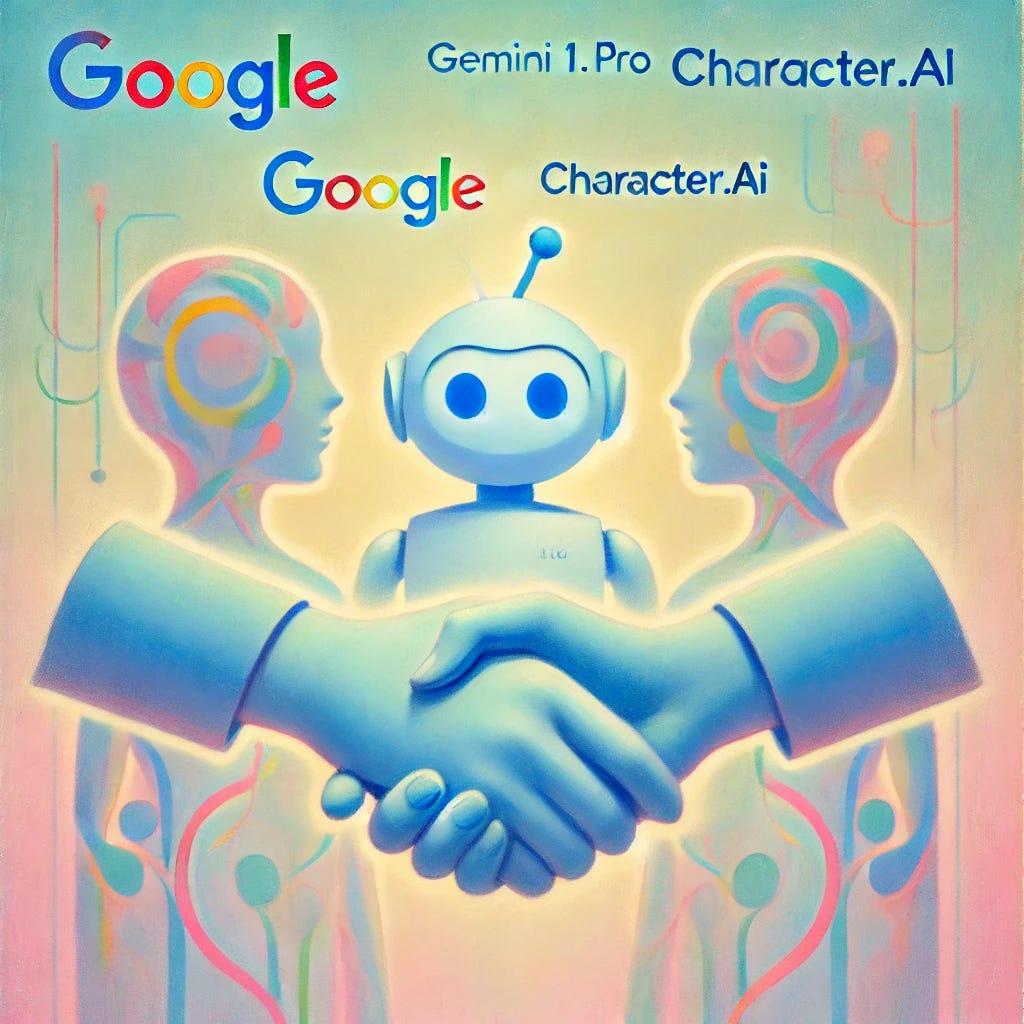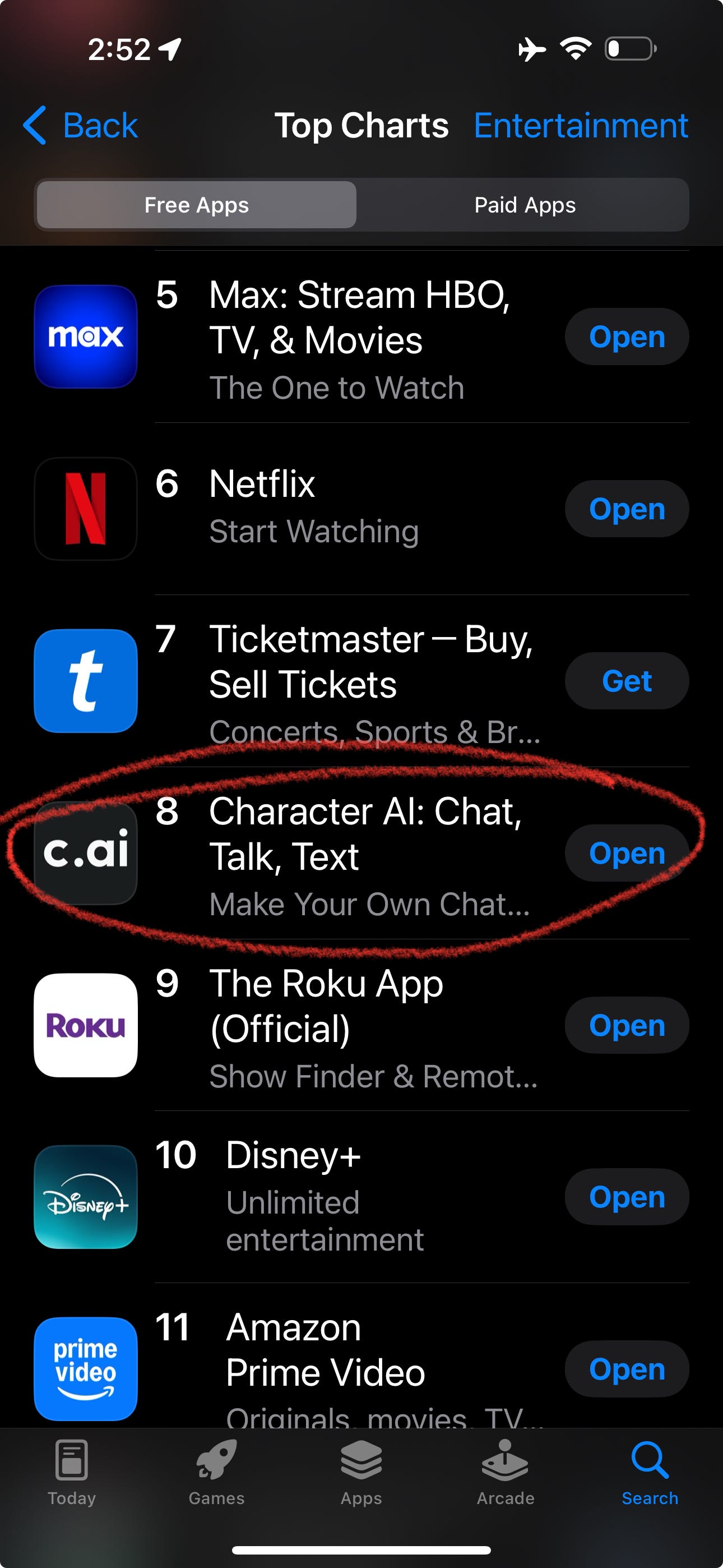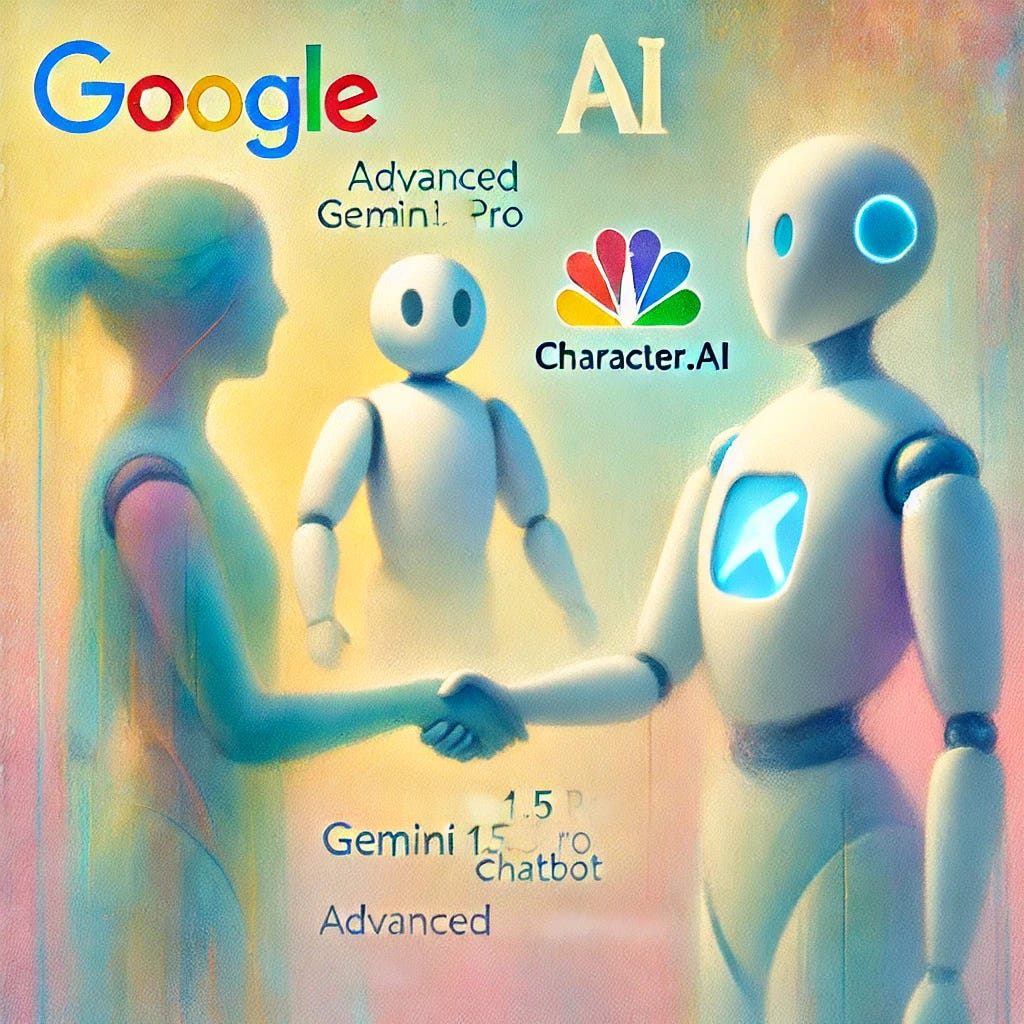🚀 Google's Bold Move: Gemini 1.5 Pro Surpasses OpenAI’s GPT-4o with Strategic Character.AI Acquisition
Google's Surprising Comeback: Gemini 1.5 Pro Surpasses OpenAI’s GPT-4, Acquires Leading AI Startup Beloved by Gen-Z.
Google surprising comeback: Gemini 1.5 Pro leaps ahead of OpenAI’s GPT-4o
The Silicon Valley heavyweight Alphabet Inc., whose Google Gemini 1.5 Pro has now leapt ahead in the AI race, challenging OpenAI's GPT-4o, pulled another ace from up its sleeve by effectively taking control of the upcoming startup Character.AI. This startup, incidentally founded by former Google employees, has gained immense popularity, particularly among Gen Z users. Even tech mogul Elon Musk, despite being heavily invested in his own AI startup xAI, had shown interest in Character.AI due to its innovative approach and growing user base.
Character.AI: Chat live with any character
Character.AI is a groundbreaking application that allows users to create, customize, and interact with AI-powered characters, both real as well as fictional. This versatile platform enables users to craft distinct personalities for their characters, set specific parameters, and publish them for others to engage with. These characters can be based on fictional entities, real life celebrities, or entirely new creations. Remarkably, you can do this with just a few sentences description you can infuse your AI characters with voice using just a 15-second voice clip of the character you want to simulate.
Gen-Z uses Character AI for everything from assistance, to role-playing and virtual boyfriends and girlfriends
The application serves various purposes, including assisting with creative writing, offering text-based adventure games, providing language tutoring, and more, including virtual girlfriends and boyfriends.
Remarkably, virtual boyfriends far outstrip the demand for virtual girlfriends. We are perhaps witnessing a translation of romance and soft porn into these digital characters that are suddenly more than a chatbot — you can give them a voice call and talk back and forth. How soon until you won’t be able to tell if it’s a real person or not? To explore that we need to dig in the underlying infrastructure.
Technological Foundation and Development
Built on cutting-edge deep learning techniques and extensive language models, Character.AI stands out for its advanced technological foundation. Developed by former Google engineers behind projects such as LaMDA (Language Model for Dialogue Applications), Character.AI leverages their expertise in neural language models to create a chatbot service capable of generating human-like text responses and engaging in meaningful, contextual voice conversations across various languages. The app also recognizes your proficiency level, ensuring that the interaction and dialogue with the simulated character are as close to real life as possible.
Founders of Character.AI
The co-founders of Character.AI are Noam Shazeer and Daniel De Freitas, both former Google employees. Noam Shazeer led the team of researchers at Google that built LaMDA, a language model used for conversational AI tools. Daniel De Freitas worked at Google for about five years before co-founding Character.AI, holding the title of senior staff software engineer and also contributing to LaMDA.
Formation and Recent Developments
Shazeer and De Freitas founded Character.AI in 2022 after leaving Google in 2021/2022. As of August 2, 2024, both Shazeer and De Freitas are returning to Google as part of a new deal between Character.AI and Google. This development signifies a strategic alignment and collaboration, allowing Character.AI to benefit from Google's vast resources—including but not limited to compute— while continuing to innovate in the field of AI-powered characters.
Character.AI's Market Success and Popularity Among Gen-Z
Character.AI has surged in popularity, ranking #8 in the entertainment category on the App Store, surpassing even giants like Disney Plus and Prime Video. This success is significantly driven by its appeal to Gen-Z, a demographic that Google highly values. The partnership with Google provides Character.AI with substantial support from a leading technology giant, effectively addressing the high costs associated with training future AI models. This support is crucial as venture capitalists grow increasingly hesitant to fund these expensive training processes.
Google— Strategic Partnership Over Acquisition
Despite Character.AI's evident success and product-market fit, Google opted for a strategic partnership rather than a full acquisition. This decision helps avoid potential antitrust issues and the complexities associated with integrating Character.AI’s popularity for for more raunchy roleplaying and less brand-safe use cases, which might not align with Google's core interests. By licensing the models and hiring key personnel from Character.AI, Google benefits from the talent and technology without the challenges of direct ownership. This arrangement mirrors Microsoft's approach with OpenAI, maintaining an arm's-length partnership that is mutually beneficial.
Future Prospects and Strategic Shifts
Character.AI's decision to pivot towards using third-party Large Language Models (LLMs) alongside its own reflects a broader industry trend. As the competition intensifies and foundational models become more accessible, startups like Character.AI are evolving from full-stack developers to specialized service providers. This shift allows Character.AI to leverage external innovations while focusing on creating unique user experiences. With its strong foothold in the market and continued popularity, especially among Gen-Z, Character.AI is well-positioned to thrive and expand its influence, potentially incorporating open-source models like Llama 3.1— of Mark Zuckerberg’s Metaverse— in future developments. The journey of its co-founder, Noam Shazeer, epitomizes the dynamic nature of Silicon Valley: leaving Google to innovate independently and eventually forging a strategic return, effectively achieving a notable industry milestone.
Details of Arrangement with Google
As of August 2, 2024, Character.AI has not been fully acquired by Google, but there have been notable developments in their relationship:
a.) Licensing Agreement
Character.AI has entered into a non-exclusive licensing agreement with Google. This agreement permits Google to utilize Character.AI's current large language model technology, marking a significant collaboration between the two entities.
b.) Key Personnel Joining Google
The co-founders of Character.AI, Noam Shazeer and Daniel De Freitas, along with several researchers from the company, are set to join Google. This move signifies a strategic alignment of talent and expertise, which is likely to benefit both parties.
c.) Leadership Change
In the wake of these developments, Dominic Perella, who served as Character.AI's General Counsel, will take on the role of interim CEO. This leadership change is expected to steer Character.AI through this transitional phase while maintaining its innovative momentum.
d.) Financial Aspects
The licensing deal with Google is anticipated to bolster Character.AI's financial position, providing the necessary funding to continue its growth and development of personalized AI products. Reports suggest that investors in Character.AI may be bought out at a valuation of about $88 per share, which is approximately 2.5 times the value of shares from its 2023 Series A funding round that valued the company at $1 billion. This indicates a robust financial trajectory for Character.AI, underscoring investor confidence in its potential.
Future Outlook
Looking ahead, Character.AI plans to leverage third-party Large Language Models (LLMs) in conjunction with its proprietary models. This strategic approach aims to focus more resources on post-training and the creation of new product experiences. While the arrangement with Google represents a significant partnership, it is not a full acquisition. This deal allows Character.AI to continue operating independently, benefitting from Google's extensive resources and expertise while maintaining its unique identity and innovative edge.
In summary, we see leading big tech companies pseudo-acquiring or hiring leading AI talent or startups without a formal acquisition. Startups have realized that venture capitalists will no longer subsidize the expensive models that will be outclassed by the big labs with deep pockets. Instead, more companies will be building on a smaller number of large models, plus an increasing number of open-source ones like Meta’s Llama 3.1. The focus will be on the user experience and building applications that people want to use, such as Character.AI.
Citations:






